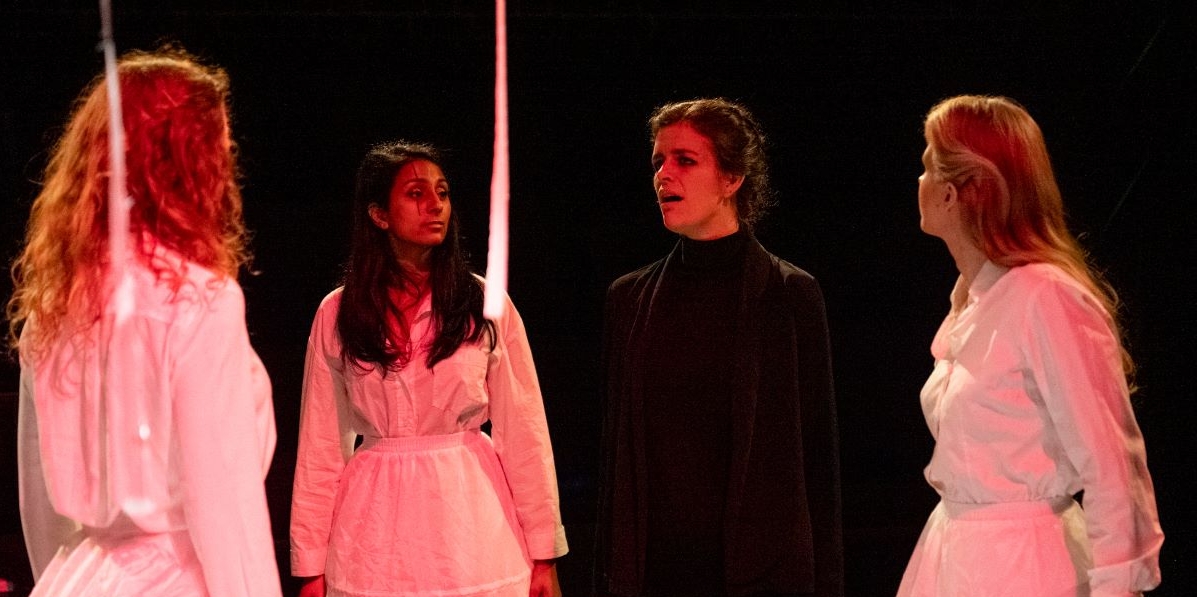Marcio da Silva’s Ensemble Orquesta (OE) returns to Grimeborn with another baroque gem. De la Guerre was a harpsichord virtuoso as a young girl and was taken into the court of Louis XIV. She went on to become a prolific composer and Cephale et Procris was first performed in Paris in 1694. The performance of operas in Paris was strictly regulated by royal decree and the so fact that the work begins with a lengthy allegorical prologue involving gods and immortals, and framed as a tribute to Louis, is unsurprising – though perhaps difficult for a modern audience to take as part of the drama. OE has a firm commitment to the worth and integrity of baroque works and they stage the prologue with characteristic musical and dramatic flair.
The story is simple in the extreme. The action is set in a mythical Athens – Cephale is a warrior and Procris is a princess. They love each other but their union is thwarted by mortal and immortal forces. Procris is also loved by Boreas, Prince of Thrace, and Cephale is loved by the goddess, Aurora. When the goddess is rejected she decides to use demonic forces to persuade the princess that Cephale has betrayed her. Procris then rejects him and succumbs to despair but at the last the goddess has a change of heart and reveals to Procris that Cephale has loved her all along. But this revelation comes too late and the lovers die in each others arms. No dramatic subtleties here, so it is in the music, and the way in which the characters’ relationships are portrayed through that music, that the worth of the piece emerges.
The thwarted love of Cephale and Procris is the heart of the opera and in Kieran White and Poppy Shotts we have young artists of the highest calibre singing with passion and impressive lyrical style. White’s high tenor – always a musical treat – here is employed to bring vividly to life the heartbreaking trials that Aurora inflicts on him. And Shotts is an entirely worthy match for him, using her powerful soprano voice to best effect in the scenes of despair when Aurora’s plans have turned her love to misery. There are other two-singer scenes, often ending in short but finely drawn duets, that impress too and demonstrate the strength of de la Guerre’s writing. The tussle between minor characters, Arcas and Dorine – sung by the ubiquitous Marcio da Silva and the marvellous Anna-Luise Wagner – is a treat and as were the scenes in which Aurora, sung by Helen May, seeks to seduce Cephale. Helen May’s voice really deserves bigger spaces than the Arcola (and the Cockpit, where OE often perform). With such a large cast it is impossible to do justice to all the fine performances but it would be unforgivable not to pay tribute to the ensemble work, typical of Marcio da Silva’s directorial style – all the performers contribute to the scene setting even when not singing. OE’s orchestra of early music specialists excel again, even when packed into what looks like an uncomfortable ‘pit’ at the back of the stage. The stage is packed full of action by da Silva, though sometimes I almost felt that it should be obligatory to read his programme notes (quite excellent, as always) before the show to make the most of the stream of symbolic references to the themes that he draws out of the opera.
Cephale et Procris is a long opera and one that demands concentration from a contemporary audience – probably unlike the behaviour expected of it original Parisian audience for whom rowdy inattention to what was going on on stage would have been the norm. This welcome addition to the OE repertoire is a fitting work to be part of the Grimeborn season and one that amply repays an evening at the Arcola.

